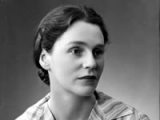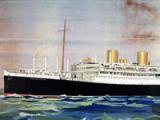What happened that day?
See historic events for any day of the year by entering the date below. Why not try your birthday?
Kiwi of the Week
Today in History

1939 Writer Robin Hyde dies in London
The journalist, poet and novelist, born Iris Wilkinson, was one of New Zealand's finest writers of the inter-war era. Troubled for years by depression, illness and poverty, she took her own life in London. Read more about Robin Hyde's life here.
Although today best known for her novels Passport to hell (1936) and Nor the years condemn (1938) and the autobiographical The godwits fly (1938), Hyde regarded herself as primarily a poet. She also spent a number of years working as a journalist, notably for the Dominion and Truth and as 'lady editor' of the New Zealand Observer.
After attempting to drown herself in 1933, Hyde spent much of the mid 1930s as a voluntary patient of the Grey Lodge at Auckland Mental Hospital. In 1938, against all advice, she travelled to the front lines of war-torn China, where she was assaulted by Japanese soldiers and stricken by illness.
Depressed and broke, she was living in a London attic as war approached in 1939. Labour MP and author John A. Lee secured government assistance to bring her back to New Zealand. On 23 August 1939 Bill Jordan, New Zealand's High Commissioner in the UK, visited her to confirm travel arrangements but found her dead. The coroner concluded that she had committed suicide by Benzedrine poisoning earlier that day. Hyde was buried in Kensington cemetery, Gunnersbury.
Image: Robin Hyde (DNZB)

1947 Assisted immigration resumes after war
Between 1947 and 1975, a total of 77,000 women, children and men arrived from Great Britain under the assisted immigration scheme. The first draft of 118 immigrants, all of them single people aged between 20 and 35, arrived in Auckland on the New Zealand Shipping Company liner Rangitata.
They were met with a 'certain amount of ceremony' by the mayor, John Allum, and the president of the Auckland Returned Services' Association. A sound truck was stationed on the wharf and played 'specially selected' music that would provide a 'suitable atmosphere for disembarkation'. In his speech of welcome, Allum acknowledged the 'many little differences' between New Zealand and Britain, and 'asked the newcomers to be patient and take time to know New Zealand ways'.
- Read more about the assisted immigration scheme
Image: the Rangitata (Te Ara )




















